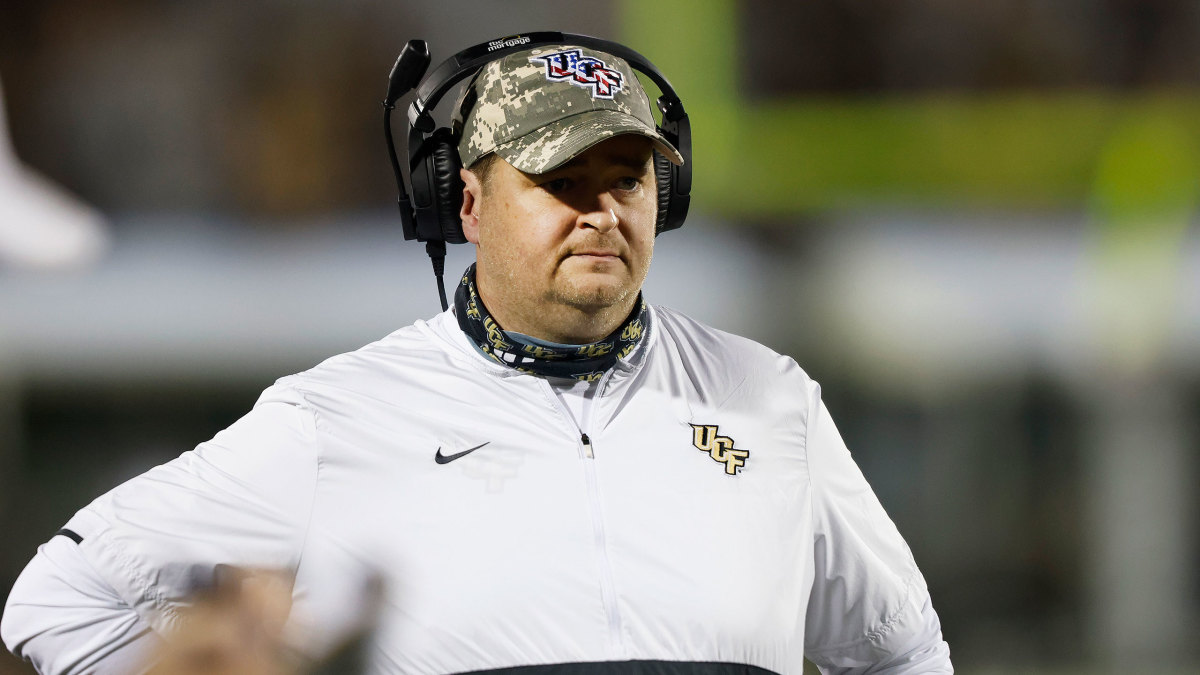Faced With Reality, Tennessee Was Destined for a Hire Like Josh Heupel

When you are Tennessee in its current state, you make a Maybe Hire.
Maybe it works out. Maybe it doesn’t. You can have hope, but no certainty. You’re in no position to lure a surefire, A-list candidate to lead your dilapidated football program—new athletic director Danny White tried that in the past few days, and it didn’t work out. So you keep working down the list—from proven to splashy to maybe—until you get a yes.
It can be a great job, on paper in the top half of the Southeastern Conference and with the potential to compete for league and national titles. But at the moment it is an iffy job, fraught with peril and clouded by the unknown, with a fan base that could politely be characterized as volatile. That reduces the viable candidate pool to Maybes, and White chose a familiar Maybe.

That’s Josh Heupel, introduced Wednesday as the new coach of the Volunteers. Heupel was spirited out of Central Florida by White, himself fresh out of UCF last week, making it fair to wonder whether White also loaded the Knights’ 2017 (mythical) national championship stadium sign onto the Tennessee private jet. The Big Orange raid on Orlando took everything but the last speck of Who Hash.
Heupel was 28–8 at UCF, a stellar record, but there is evidence that the program was declining beneath him. He inherited a team coming off a 13–0 season with a returning superstar quarterback in McKenzie Milton, and his seasons went 12–1, 10–3, 6–4. After a 9–0 debut season in the American Athletic Conference, he went 11–5 the next two seasons.
(History may regard Milton most kindly of anyone when it comes to UCF’s ’17 to ’18 run. Scott Frost’s record as a head coach with Milton as his starting quarterback was 17–6; without him it’s 14–21. Heupel’s record with Milton was 11–0; without him it’s 17–8. And Milton’s presence at UCF played a significant role in fellow Hawaiian and current starting QB Dillon Gabriel’s coming to school there.)
For many Tennessee fans, the Heupel hire is the next step in coming to grips with what the program is. They’ve ignored a dozen years of evidence that the Vols are just another program—instead believing in Santa Gruden, and believing that hiring coaches like Greg Schiano and Dave Doeren was beneath them. Fact is, this is a tough sell at present.
James Franklin wasn’t leaving the job security of Penn State for Tennessee, no matter how much money White was rumored to be offering. P.J. Fleck? Please. SMU coach Sonny Dykes isn’t leaving the state of Texas for a struggling program that has to battle Alabama, Georgia and Florida every season. And offensive coordinator Tony Elliott wasn’t going to depart the rock-solid reliability of Clemson for Rocky Top.
Since Phillip Fulmer’s last good season, in 2007, this is what Tennessee football has been: a losing program (78–82 overall, 36–70 in the SEC, zero East Division titles); a program in constant transition (Heupel is the sixth permanent head coach); and now a program immersed in a self-acknowledged major NCAA investigation that has months (perhaps years) left to unspool.
From ’08 to ’20, the Vols’ SEC winning percentage was .339. The only East Division programs lower than that are Kentucky and Vanderbilt. South Carolina (.481) and Missouri (.473 since joining the league in ’12) are well ahead of Tennessee.
The records against the teams the Vols used to battle in the East are frightful: Florida has won 15 of its last 16 against Tennessee; Georgia has won nine of its last 11. And the annual crossover rivalry against Alabama is a recurring nightmare—the Crimson Tide have won 14 straight. Ever since Bama nose tackle Terrence Cody blocked a last-second field goal for the win in ’09, Lane Kiffin’s only season at UT, the fates of the two programs have been drastically divergent.
Alabama is winning national titles. Tennessee leads the nation in dysfunction.
Hiring White was at least a step toward competency, and away from the toxic culture that has percolated for far too long in Knoxville. Fulmer backstabbed his way into the athletic director job amid a ludicrous fan revolt and wasted no time proving his inadequacy in that position. He hired unproven Jeremy Pruitt because he was an SEC Ball Coach, and what he got was a guy who couldn’t win and whose staff couldn’t play by the rules.
The ex-coach, comfort-hire AD is a relic of the 20th century. White is a clean break from that. He’s being paid a lot ($1.8 million) to clean the place up and to run a department impervious to meddling fans and boosters. How Vol Nation accepts a Heupel hire that doesn’t thrill the populace will be a measure of its understanding that this is a new era.
Heupel does fulfill White’s wish for a coach with a certain brand—in this case, high-powered, fan-friendly, recruit-friendly offense. UCF was second nationally in total offense in ’20, averaging 568.1 yards per game, and Gabriel led the nation in passing yards per game at 357. After years of watching Tennessee offenses sputter, that should be changing.
The flip side is that UCF allowed 33.2 points per game in ’20, 92nd nationally and its most since a winless season in ’15. That was a big reason why the Knights didn’t beat a single team last season that finished with a winning record. That 6–4 mark isn’t built on anything of substance.
Cincinnati, a more complete team, had become the dominant program in the AAC. Memphis won the league title in ’19. UCF’s run was brilliant, but brief, leaving questions about whether it can be replicated in a much tougher conference and at a school with fewer natural advantages.
Maybe Josh Heupel can do it. Maybe he can’t. That’s exactly the kind of hire tattered, troubled Tennessee was destined to make.
